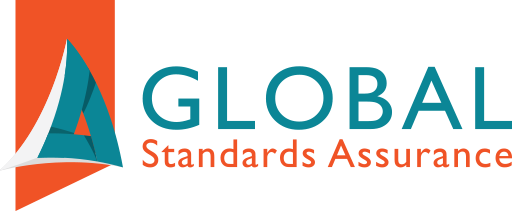Global Standards Assurance (GSA)
With ISO 27001:2022 enhances organisational resilience
by providing a systematic framework for effective information security management, safeguarding data integrity, confidentiality, and availability.
WHAT IS ISO 27001:2022
ISO/IEC 27001 is a globally accepted standard that outlines the requirements for developing and maintaining an Information Security Management System (ISMS). It provides organizations with a systematic framework to manage information security risks and ensure the confidentiality, integrity, and availability of their information assets through tailored controls and processes.
Organisations adhering to ISO 27001 focus on identifying, assessing, and mitigating information security risks, fostering a culture of continuous improvement. The standard is adaptable to organizations of various sizes and industries, promoting a proactive approach to information security that aligns with evolving technological landscapes. ISO 27001 establishes a foundation for robust information security practices in an interconnected and digital business environment.

WHAT IS ISO 27001:2022 CERTIFICATION?
ISO 27001 certification is a designation awarded to organizations that have successfully implemented an Information Security Management System (ISMS) based on the requirements outlined in the ISO/IEC 27001 standard. This international standard specifies the framework for establishing, implementing, maintaining, and continually improving information security within an organization.
If the organization successfully passes the certification audit, it is awarded ISO 27001 certification. This certification is a testament to the organization’s commitment to information security best practices and provides assurance to stakeholders, customers, and partners that the organization has a robust system in place to manage and protect sensitive information.
BENEFITS OF ISO 27001:2022 CERTIFICATION
Security Assurance
ISO 27001:2022 ensures robust information security through systematic risk management, safeguarding sensitive data.
Global Credibility
Certification provides international recognition, bolstering an organisation's credibility and signalling adherence to global information security standards.
Regulatory Alignment
ISO 27001:2022 aids in meeting legal and regulatory requirements, showcasing a commitment to information security compliance.
Market Differentiation
Certification offers a competitive advantage by demonstrating a dedication to best practices, setting the organization apart in the marketplace.
Streamlined Processes
Implementation leads to well-defined information security policies, improving overall business processes and efficiency.
Resilient Risk Management
A risk-based approach enhances resilience, enabling organizations to systematically identify and mitigate security threats.
ISO 27001:2022 CERTIFICATION PROCESS

Initiation and Planning
Begin the ISO 27001 certification process by defining the scope of the Information Security Management System (ISMS). Conduct a thorough risk assessment to identify and evaluate potential information security risks. Develop a comprehensive information security policy and establish clear objectives for the ISMS.

Implementation of ISMS
Move forward with the implementation phase by documenting and establishing information security procedures and controls. Implement measures to address and mitigate the identified risks. Ensure effective communication and training programs for employees to familiarize them with information security policies and procedures.

Internal Audit
Conduct internal audits to assess the effectiveness of the implemented controls and procedures. Identify areas for improvement and initiate corrective actions as necessary. This phase is crucial for evaluating the readiness of the organization for the external certification audit.

Management Review
Engage in a management review to evaluate the overall performance of the ISMS. Assess whether the objectives are being met and determine the need for any changes or improvements to enhance the effectiveness of the system.

Certification Audit Preparation
Prepare for the external certification audit by assembling all necessary documentation, including policies, procedures, and evidence of internal audits. Ensure that the organization is fully compliant with ISO 27001:2020 requirements before engaging with a third-party certification body.

Certification Audit by External Body
Engage a reputable third-party certification body to perform an independent audit of the ISMS. Demonstrate the effectiveness of the ISMS in meeting ISO 27001:2020 requirements. Upon successful completion of the audit, the organization will be awarded ISO 27001:2020 certification, signifying its commitment to robust information security practices.
HOW WE CAN SUPPORT
Educational Support:
Offer organisations comprehensive educational resources and sessions to familiarize them with the intricacies of ISO 27001:2022 requirements, the certification process, and the associated advantages.Preparation Assistance:
Extend support to organisations in the preparation phase by providing guidance on the development of documentation, including policies, procedures, and controls, ensuring alignment with ISO 27001 standards.Training Programs:
Conduct tailored training programs and workshops aimed at enhancing the knowledge and awareness of organizational personnel regarding ISO 27001 requirements and best practices.
Certification Audit Execution: Collaborate closely with organizations to plan and execute meticulous certification audits, evaluating their adherence to ISO 27001 standards and ensuring a comprehensive assessment.
Post-Certification Support:
Upon successful completion of the audit, issue ISO 27001 certification and emphasize the importance of maintaining and continually improving Information Security Management Systems (ISMS) to sustain the benefits of certification.
WHY GLOBAL STANDARDS ASSURANCE ( GSA)
Competitive Pricing
We understand the financial considerations for businesses, especially small businesses. We offer competitive pricing for our certification services, ensuring that you receive exceptional value for your investment. Our pricing structure is designed to be cost-effective and suitable for organisations of various sizes and budgets.
Marketing and Branding Support
We provide marketing and branding support to small businesses by highlighting their ISO 14001:2015 certification on our website, marketing materials, and social media platforms. This increased visibility helps them attract customers who prioritize sustainability.
Tailored Solutions
We understand that each business has unique needs and challenges. We offer tailored certification solutions to meet your specific requirements, ensuring that the certification process is aligned with your resources and objectives. Our flexible approach ensures a customized experience that suits your organisation's size, industry, and goals.
Value-Added Services
Beyond certification, we offer a range of value-added services to support your environmental management efforts. These may include training programs, workshops, guidance on best practices, and continuous improvement initiatives. We aim to be your long-term partner in enhancing your environmental performance and achieving sustainability goals.
Expert Support and Guidance
Switching to us provides small businesses with access to our experienced team of auditors and experts who will guide you through the certification process. We offer personalised support, answering their questions and providing assistance at every step.
Simplified Process
Our certification process is designed to be streamlined and efficient, minimising disruption to your organisation's operations. We provide clear guidance on the requirements and steps involved, making the certification process straightforward and manageable for your team.
FREQUENTLY ASKED QUESTIONS
ISO 27001:2022 is an international standard that specifies the requirements for establishing, implementing, maintaining, and continually improving an Information Security Management System (ISMS).
ISO 27001 is crucial for organizations as it provides a systematic framework for managing information security risks, safeguarding sensitive data, and demonstrating a commitment to best practices.
Certification enhances an organization’s credibility, ensures compliance with legal and regulatory requirements, and provides a competitive advantage by showcasing a commitment to robust information security practices.
The process includes initiating an ISMS, implementing controls, conducting internal audits, engaging a certification body for an external audit, and addressing non-conformities to achieve and maintain certification.
The timeframe varies based on the organization’s size and complexity. On average, the certification process may take several months, including the necessary preparations and audits.
A risk assessment in ISO 27001:2022 involves identifying, evaluating, and prioritizing potential information security risks to determine the necessary controls for mitigating or managing those risks.
Internal audits should be conducted at regular intervals, typically annually, to assess the effectiveness of implemented controls, identify areas for improvement, and ensure ongoing compliance with ISO 27001:2022 requirements.
Yes, ISO 27001:2022 can be integrated with other management system standards, such as ISO 9001 (Quality Management) and ISO 14001 (Environmental Management), using a framework known as an Integrated Management System (IMS).


